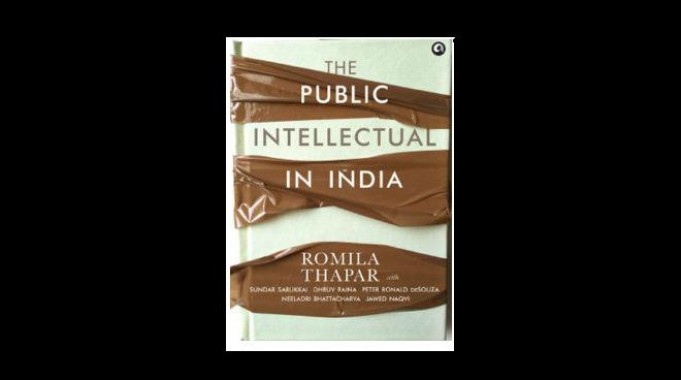Creating public intellectuals
Book Review
The Public Intellectual in India
Romila Thapar
Published by Aleph and The Book Review Literary Trust
Pp 170
Rs 500
Last year, at the invitation of the Book Review Literary Trust, Romila Thapar, the Left-leaning historian, delivered the 3rd Nikhil Chakravarty Memorial lecture. The late Mr Chakravarty was one of India’s most influential editors. He edited the small circulation but highly influential magazine Mainstream for several decades. Mr Chakrvarty used to be a Communist at one time. He had the ear of at least three prime ministers.
Enter Narendra Modi as prime minister in May 2014.
Since then a vigorous debate has been going on about the intellectual atmosphere in the country. The old guard which blossomed under Congress’s left leaning rule of 60-odd years thinks everything is going to the dogs. The new BJP-RSS rulers deny this hotly and say that they are only positing new ways of looking at history.
As the debates smoulders on, an important question has been left to take care of itself: who exactly is an intellectual? No one can quite agree on the definition. Thus, is a person highly learned in the ancient Hindu texts -- and not much else -- an intellectual? Is a person who knows nothing outside of Marx an intellectual? What is intellect?
This is where prejudice comes in. Each side rejects the other with contempt and derision. That, surely, is not the spirit of enquiry or ijtihad, as Thapar would wants it to be. But as you read her essay, you slowly become aware of how dismissive she herself is.
There is another problem: people usually confuse scholarship with intellectualism. But while scholarship is necessary to be an intellectual, it is not sufficient. To be an intellectual, you have to be scholarly, thoughtful and, above all, neutral.
The Public Intellectual
Between the scholar and the intellectual lies a relatively new category, the public intellectual who voices strong and biased opinions in the media. The bias is usually well disguised but it is there. A public intellectual therefore always takes political sides. In fact non-neutrality seems to be a necessary as well as sufficient condition in order to become a public intellectual.
Enter, now, the media. It provides the platform for public intellectuals. There was a time when entry was strictly regulated. But today the Internet provides an open platform where everyone, including me, is free to parade his or her intellect -- or the lack of it, as is mostly the case.
The criticism of Narendra Modi and his party’s social policies has to be viewed in the light of what these public intellectuals are saying about him. It is no secret that not many are happy with him.
The current debates have to be seen in this context and this book provides us with a way to conduct them. Without explicitly saying so, is about the atmosphere Modi and his party have created in India.
The centrepiece is the long essay by Romila Thapar called ‘To question or not to question? That is the question’. She has also written the Introduction and the Conclusion.
She is very downcast about the prospects of intellectuals under Modi’s regime. “Where there should be voices there is now silence”, she laments. Overall, her assessment is that knowledge today runs the risk of being captured by ignorant people who will propagate historical untruths and crude ideas. She does not actually define a public intellectual.
She writes beautifully and convincingly if you already half-believe what she is saying. The evidence she provides is strong but not irrefutable. Or, at least, her opinions are as open to challenge as any.
There are altogether six essays in the book, including the one by Thapar. Philosopher Sundar Sarukkai discusses the process and method of such questioning and concludes that doubt lies at the heart of questioning. ‘To question’, he says, is to not accept. That right is fundamental to the human condition and mere politicians cannot abrogate or abridge it.
Neeladri Bhattacharya, professor of History at Jawaharlal Nehru Univeristy, says he doesn’t share Thapar’s pessimistic view that thanks to Modi-BJP-RSS the end is near. He points out that silence can also mean approval, not fear. He adds that it is important to focus on a number of small things, rather than do some grandstanding on one or two large ones. Presumably, the latter bit can be left to political parties.
There are three other essays – marvellously readable ones -- by Dhruv Raina, Peter DeSouza and Jawed Naqvi. Each raises valid and important issues that need further debate.
Raina is a professor at JNU. He has focussed on science: its tendency to question and the response of the prevailing orthodoxy to suppress such questioning. He gives some modern examples of this, such as the UK government’s order that scientists cannot speak to the media.
Peter De Souza, who is a professor at the Centre for Developing Societies in Delhi, says public intellectuals perform an important function: they focus public attention on things that are, or may turn out to be, unjust. But he also says that they must know which battles to fight and which ones to let go. This advice is particularly apposite at this point in India.
The Media and the Intellectual
To conclude, the issues raised in this slim volume are of deep and lasting significance. They are also permanent in every society. A short review like this one can’t do justice to all of them. But I do wish the editors had asked a journalist to write about the role of the media in the creation not just of issues – at which it is quite good – but also the public intellectuals it creates.
As Sumer Kaul, the edit page editor of the Indian Express used to say, it is the media which creates a successful public intellectual.
TCA Srinivasa Raghavan is Consulting Editor, Business Standard







